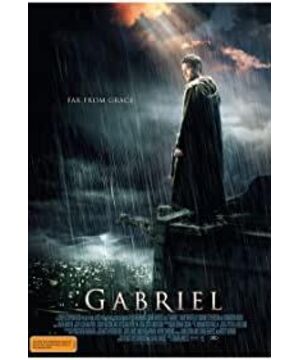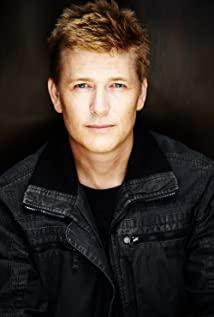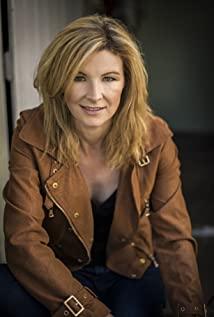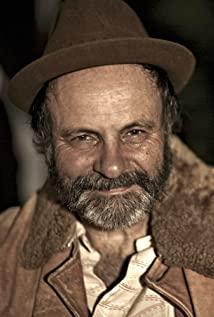Secondly, this is a movie with a very complicated meaning, which requires a lot of religious knowledge, and is also aimed at relatively small audiences who have experienced a deeply helpless ending. Most movies with complex meanings begin with the ending, and this one is no exception.
Gabriel was healed by Michael when he was dying, and he stood up with anger and doubts about God.
At this time, the sky in the movie appeared light for the first time, but it was still in a mixture of light and darkness (the light came completely at the same time as the final judgment for Ametiel and many evil citizens, don’t think that light is gentle ) - because Gabriel's questioning has violated the commandment in a small way: God cannot be questioned. Therefore, the war between light and dark has not yet been finalized, and everything depends on Gabriel's final choice. Turning blue or brown means victory, and black means chaotic neutrality.
He looked up at the sky and asked suspiciously, "Is this what you want?"
and then angrily shouted again in a nearly virtual rhetorical tone, "Is this what you wanted?" What happens in questioning is some kind of very high-level setup.
"You have told me everything, except for this, how can I change everything that has happened?"
It means: Gabriel has envisioned all the possibilities after his birth, but he did not expect this ending. He couldn't face himself (the death of his comrades in arms, the fall of his girlfriend, the betrayal of his brother, he killed his brother with his own hands, but the person who was killed eventually saved him), so he had to think that all this was because God deliberately concealed the ending, but there was no revelation to show it. to him without changing the outcome (because he believes that God is omnipotent and omnipotent). He wants to change the ending.
"Michael, Amethyr, I need (you help me) to feel it (how to solve it), I want to know how it all happened (why did you fall in the past, how did you fall, how did this fall such pain).”
Gabriel is asking why this happened.
"(After the victory of the war, even if you are dead, as long as you do not do things that seriously violate the commandments such as betrayal and suicide) you will be reborn in the form of new angels and forget all these experiences.
" Or the words taught by Michael, which contains a lot of religious content, the simplest is that the angels of light can be reborn in heaven after death as long as they do not violate the commandments and do not die at the hands of other angels of light or fallen angels, and suicide is One of the violations of the commandments. That's why alcoholics don't dare to get rid of their pain by committing suicide. Of course, evading duty is also a violation of the precepts, but because betrayal and suicide are very obvious, and escape is not so obvious after all, they have to take luck in the face of insurmountable difficulties and try to get away with it. Humanity" choice. But this promise of rebirth, because all the angels of light felt that the connection with God was weakened to the extreme (Gabriel rolled his eyes and hugged his head after he came into the world, because what sounded in his mind was the temptation of darkness, the moan of pain, and no longer It is God's guidance and hymn. This is one of the fundamental reasons why the angels are hesitant to fight to the end), and "appears" less reliable in the dark city - it may be true, but it may just be a test It even includes the statement that if you are killed by other angels, you can't be reborn again. Anyway, God likes to test people just like your girlfriend.
"I can't allow this to happen."
Gabriel couldn't tolerate the tragic ending of Michael and others, and he was reborn as an angel by himself. For him, the memory of the angel's life was everything to him, and this memory was mainly created by Michael Le, Amethyr composition.
"You kept me away from glory, and now, I'm going to fall into it."
God you sent me into this world, took me away from the peace and glory of heaven to fight for you, and told me that in the end I'll get back to heaven Peace, glory, this is your will. But my free will tells me that at this moment, only my fall (fall and fall is a word in English, this is the key word of the movie) can let me regain the peace and glory - my own peace and glory glory.
That is to say, Gabriel refused to let himself be honored by God's final judgment, and decided to commit suicide. He could not tolerate himself being the winner and being happy alone, while sitting and watching Michael die completely and Ametiel was finally judged, and he couldn't bear it. Allow yourself to forget all this, and forget Michael who represents friendship and Ametil who represents love.
Standing on the edge of the void of the tall building (note that it is standing on your back), looking up at the sky, "I hope I can see you again." This scene is very complicated, and it can only be understood by oneself, and it takes ten thousand words to explain.
Then, yes - Falling.
"Falling is the last thing an angel feels. A distant voice still echoes inside my head. But for the first time, it is my own. Forgive me." - "Falling, is the last thing an angel feels. A distant voice. , is still echoing in my head. But for the first time, it belongs to me. Please forgive me."
This is the last scene of Gabriel, and it is impossible to say whether it is a fall or a fall, so I can only use English Falling. It is also impossible to say clearly whose forgiveness Gabriel is begging for, God's, friends, brothers, lovers, or the world...
Perhaps, Roh Moo-hyun was in this mood when he jumped off the cliff.
The reason why the ending cannot be explained as "Gabriel has become darkness, so he can only bring light to the world by suicide" is because of this sentence. If suicide was due to obedience to God's rules or will, there would be no partial light in the sky and no "it is my own. Forgive me" statement. This also responds to a bunch of persuasive remarks by Michael. Michael did evil because of free will. The movie gives another kind of free will at the end, which shows that free will is not all evil thoughts.
This line is the center of the whole movie, and the corresponding line is "Falling is the first thing I feel. Distant voice echoes inside my head." - "Falling, is the first feeling when I come. Distant voice ( God's voice), echoing in my head." This is a line from Gabriel at the beginning of the film as he descends through a tunnel of time and space.
In the next picture, although Gabriel self-destructed because of his own judgment, it actually met God's standard. This round of the game was judged as God's victory, the light showed, God's final judgment came, and Ametil came to the window. Looking at Chaoyang, she was forgiven, she didn't need to die out completely, and she didn't need to fall into hell, she could continue to live in the world until she died as a human being.
A new round of games starts in another city.
And Gabriel, only Falling, did not say that his soul died because of suicide, he did not say that he was forgiven and redeemed because of victory, and he did not expressly say that he would go to hell because of falling. His final outcome, like each of us: unknown, uncertain .
This is a moral inspirational film of tragic heroism, talking about moral guidance, fighting hard, helplessness in the world, free will, and self-judgment.
The director wants to target some people whose living standard is higher than food and clothing, and whose psychological level has also been separated from "famine memory", no longer frantically scrambling for survival resources, and instead begins to seek self-worth and experience complex and painful choices.
These seven angels represent their choices and endings in the face of temptation and coercion. Lemuel died in battle, Uriel escaped passively (drinker), Ithuriel actively escaped (porridge cook), and Raphael was weak and fearful (would rather not get up). The wounded - this requires religious knowledge to understand, because Raphael's main job is to heal, and his never-healing is not a matter of ability, but a mentality, so even after Gabriel healed him, he still didn't get better, He didn't get better until he died, and Gabriel healed himself and others as soon as possible...), Amitiel succumbed to the dark chaos, Michael became the leader of the dark, and Gabriel, after victory, because of over-perfect morality conduct self-judgment.
There are two ways to encourage people to be kind. One is a happy ending. It means that kindness will always be rewarded with good things—material rewards. In this way of ending, even if what you get is emotional, it is realistic and material. There is no such thing as being in love and not being able to get it physically. This is the most common, foolish deceit.
The other is tragic heroism, like Gabriel.
Gabriel completed his mission, but he did not have any happiness. He experienced too much darkness. His pain and helplessness made him unable to obey God's guidance and instead obeyed his own free will.
The real reason for the so-called "getting away to hide and name" is moral self-judgment, and therefore self-exile - the price paid in the process of maintaining and creating light and justice, letting him know that he has been contaminated with darkness, And he couldn't allow himself to stand on the bones of his comrades and lovers and cheer for victory.
In the history of the East and the West, there have been some similar characters, such as Washington, whose repeated seclusion is self-exile, such as Roh Moo-hyun's suicide by jumping off a cliff, and many novels will have similar plots.
Some people may ask, where is the fucking inspiration? There is no happy ending, is it still inspirational? Only idiots do it!
That's exactly what this movie is about -
when everyone is born, they are angels. We have always been taught to be good people, because good is rewarded with good and evil is rewarded with evil, and God (or justice, justice) enforces this law.
But when we grow up, we all start to wonder, we don’t know if it’s true or false, if it will be fulfilled, and when it will be fulfilled.
Therefore, when we face temptation and coercion, we have various options, just like those angels.
So why be a good person?
Because free will tells me it's right, and there's no other deeper or more reason and reason—just because, it's right.
No matter in the field of career or love, there is no necessary connection between a good person and a good reward. To be a good person is just because it is right to be a good person.
this is the truth.
Why does the movie tell us such a cruel reality?
Because even if we don’t tell us, we are still escaping and obeying in reality. Even if we are motivated by some movie or model for a while, it will not last, because we need “good retribution” as a reward, but reality does not have such incentives, and God even It doesn't exist at all...
Only the choices made after facing the reality directly are the real free will.
Only under this free will, good people who recognize the unknown and helpless ending can persevere and make the world truly better.
The motivating point is that the world is getting better after all - although he may not benefit himself, and no one even knows what he has done for it.
And, "To show them that there is another way" - "to show the world another way of life" is what this movie really means.
Since there are too many bad people and smart people in this world, and not enough good people and fools, let me add something.
It's not cool to be the bad guy anymore, because there are so many, isn't it?
What the movie is trying to tell us is that being a good person is not for reward, not because of being taught by God or anyone, just because my free will is telling me that it is right.
View more about Gabriel reviews











